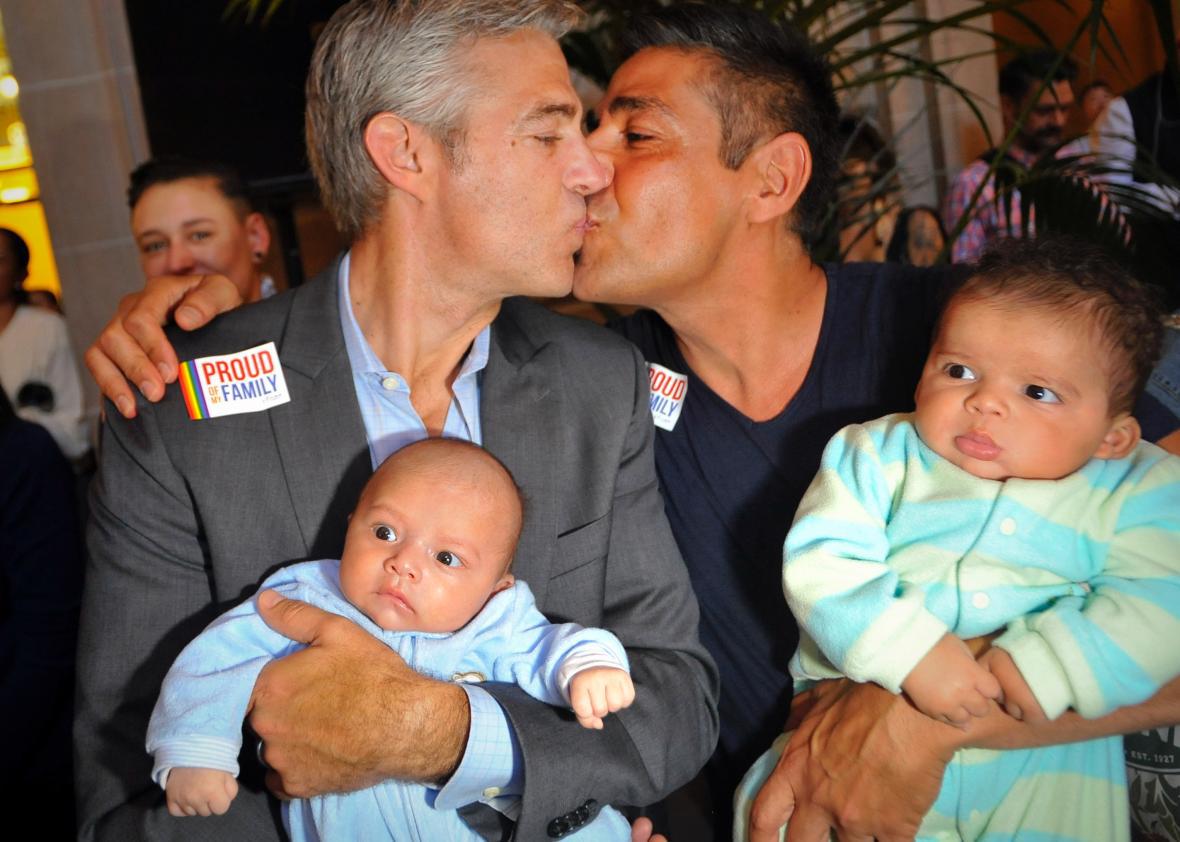A Kentucky family court judge announced last week that he will not grant adoptions to same-sex parents because of personal religious objections to homosexuality. Although both state and federal law guarantee the right of same-sex couples to adopt, Judge Mitchell Nance will recuse himself from all relevant cases because he believes it is not in the “best interest” of children to have gay or lesbian parents.
For years, social conservatives have been trying, with some success, to carve out special rights that exempt them from following laws on equal treatment. The effort picked up momentum after the Supreme Court ruled in 2015 that same-sex couples had a constitutional right to marry and to all the “rights and responsibilities intertwined with marriage,” which clearly include the right to parent.
But Nance’s arrogation of special rights of “conscience” opens a dangerous new front in the religious war against LGBTQ equality. In an order announcing his decision, Nance cited his “conscientious objection to the concept of adoption of a child by a practicing homosexual,” explaining that, in his personal view, the best interest of a child could, “under no circumstance,” be served by having gay or lesbian parents.
Nance did not defend his decision to recuse himself by making the case that children’s interests are actually harmed by having gay or lesbian parents. That’s because he couldn’t. As Mark Joseph Stern explained a year ago in Slate, the debate over whether same-sex parenting harms kids is over—and discrimination lost. Stern cited the latest scholarly study finding that children with same-sex parents faced no disadvantages compared to children with straight parents, and he also cited Columbia Law School’s “What We Know Project” (which I direct), which lists 75 peer-reviewed studies concluding the same.
Here’s what’s scary: Having lost the war over facts, Nance has instead embraced his bias, citing a state judicial conduct code requiring judges to recuse themselves if they have “a personal bias or prejudice” concerning a case. Conservative religious groups supported the judge’s move, and a statement from one such advocate lays bare the broken state of empirical truth in our nation’s legal system in the Trump era. “If we are going to let liberal judges write their personal biases and prejudices into law,” said Martin Cothran of the Family Foundation of Kentucky, “as we have done on issues of marriage and sexuality, then in the interest of fairness we are going to have to allow judges whose personal biases and prejudices are different to recuse themselves from such cases.”
This is an extraordinary statement—the equivalent of Kellyanne Conway citing “alternative facts” to explain the White House’s delusional claims that Donald Trump’s inauguration crowd was the largest ever. In the Trump era, the right wing (which used to complain about the moral relativism of the left) views the world of politics as a might-makes-right contest of competing biases. If you learned on your mother’s knee that gay people are bad, and you can get enough people to vote with you to enact that belief into policy, that is, for today’s right wing, a proper way to deploy the power of the law.
Gone are the days when policy advocates argued about which facts are correct, by marshaling evidence and trying to persuade. Gone are the days when even social conservatives respected the principle that the law should be applied without bias, and sought to deploy facts instead of tossing them aside. Today’s religious right (as with the alt-right), furious that their years of false claims about the alleged threats of various minorities have not been born out by factual evidence, have stopped even trying to play the game according to basic rules of reason.
It’s important to be clear on what Nance is not saying: His argument here is not that he believes gay adoption is wrong. It’s that, “as a matter of conscience,” he believes it harms the interests of children. Yet it’s impossible to square the circle: By placing debates over facts, which tell us that adoption by gay people does not harm children’s interests, into the realm of conscience, Nance conflates empirical claims with moral ones. He cannot meaningfully claim a “conscientious objection” to adoption by gay people any more than he can claim a conscientious objection to gravity.
This new front in the religious attack on LGBTQ equality shows no signs of slowing. In fact, it appears to be widening its net, and it’s crucial that it be recognized as not just an anti-LGBTQ backlash but part of the reactionary assault on the role of truth in our lives. As always, much more is at stake than the rights of any one group when the powerful come for the vulnerable.
